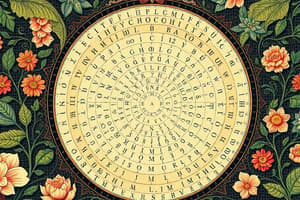Podcast
Questions and Answers
Lateral thinking puzzles always require using reasoning and deduction to solve a problem.
Lateral thinking puzzles always require using reasoning and deduction to solve a problem.
False (B)
Brain teasers are designed to be boring and unengaging.
Brain teasers are designed to be boring and unengaging.
False (B)
Wordplay puzzles use images and spatial reasoning to solve a problem.
Wordplay puzzles use images and spatial reasoning to solve a problem.
False (B)
Brain teasers often have a single, definitive answer.
Brain teasers often have a single, definitive answer.
Misdirection is a technique used in brain teasers to distract from the solution.
Misdirection is a technique used in brain teasers to distract from the solution.
Solving brain teasers can improve short-term memory but not long-term memory.
Solving brain teasers can improve short-term memory but not long-term memory.
Brain teasers can help reduce stress and anxiety by providing a fun and engaging way to relax.
Brain teasers can help reduce stress and anxiety by providing a fun and engaging way to relax.
Taking your time is not important when solving brain teasers.
Taking your time is not important when solving brain teasers.
Brain teasers only improve cognitive flexibility and not problem-solving skills.
Brain teasers only improve cognitive flexibility and not problem-solving skills.
Reading carefully is not necessary when solving brain teasers.
Reading carefully is not necessary when solving brain teasers.
Flashcards are hidden until you start studying
Study Notes
Brain Teasers
Brain teasers are a type of mind game that challenge the brain's ability to think logically, critically, and creatively. They are designed to be fun and engaging, while also improving cognitive skills.
Types of Brain Teasers:
- Lateral thinking puzzles: Require thinking outside the box and finding unconventional solutions.
- Examples: The Barber Paradox, The Prisoners and the Hats
- Logic puzzles: Involve using reasoning and deduction to solve a problem.
- Examples: Sudoku, Logic grids, Syllogisms
- Wordplay puzzles: Use language and semantics to create a puzzle.
- Examples: Crosswords, Anagrams, Word scrambles
- Visual puzzles: Use images and spatial reasoning to solve a problem.
- Examples: Optical illusions, Pattern recognition, Mirror puzzles
Characteristics of Brain Teasers:
- Ambiguity: Often have multiple possible answers or interpretations.
- Misdirection: May use language or visuals to distract from the solution.
- Counterintuition: Require thinking against instinct or habit.
- Cognitive biases: May exploit common cognitive biases, such as confirmation bias or anchoring bias.
Benefits of Brain Teasers:
- Improved cognitive flexibility: Enhance ability to think creatively and adapt to new information.
- Enhanced problem-solving skills: Develop critical thinking and analytical skills.
- Boosted memory and attention: Improve short-term and long-term memory, as well as attention and focus.
- Reduced stress and anxiety: Provide a fun and engaging way to relax and challenge the mind.
Tips for Solving Brain Teasers:
- Take your time: Don't rush into a solution; think carefully and consider multiple possibilities.
- Read carefully: Pay attention to the language and wording of the puzzle.
- Look for patterns: Identify patterns and connections between elements.
- Think outside the box: Be willing to consider unconventional solutions.
Brain Teasers
- Brain teasers are mind games that challenge logical, critical, and creative thinking while improving cognitive skills and being fun and engaging.
Types of Brain Teasers
- Lateral thinking puzzles require finding unconventional solutions and thinking outside the box, with examples like The Barber Paradox and The Prisoners and the Hats.
- Logic puzzles involve using reasoning and deduction to solve a problem, with examples like Sudoku, Logic grids, and Syllogisms.
- Wordplay puzzles use language and semantics to create a puzzle, with examples like Crosswords, Anagrams, and Word scrambles.
- Visual puzzles use images and spatial reasoning to solve a problem, with examples like Optical illusions, Pattern recognition, and Mirror puzzles.
Characteristics of Brain Teasers
- Ambiguity means puzzles often have multiple possible answers or interpretations.
- Misdirection uses language or visuals to distract from the solution.
- Counterintuition requires thinking against instinct or habit.
- Cognitive biases may be exploited, such as confirmation bias or anchoring bias.
Benefits of Brain Teasers
- Improved cognitive flexibility to think creatively and adapt to new information.
- Enhanced problem-solving skills through critical thinking and analytical skills.
- Boosted memory and attention, improving short-term and long-term memory, attention, and focus.
- Reduced stress and anxiety through a fun and engaging way to relax and challenge the mind.
Tips for Solving Brain Teasers
- Take your time to think carefully and consider multiple possibilities.
- Read carefully to pay attention to the language and wording of the puzzle.
- Look for patterns to identify connections between elements.
- Think outside the box to consider unconventional solutions.
Studying That Suits You
Use AI to generate personalized quizzes and flashcards to suit your learning preferences.




